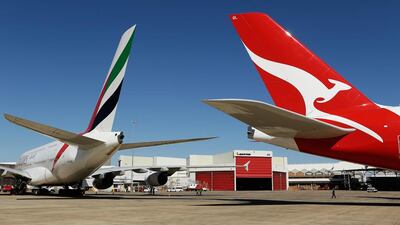Australia announced at the weekend a deal with the UAE that will significantly boost flight numbers between the two nations, a move that is expected to increase tourism and possibly reduce ticket prices.
The bilateral agreement allows Emirates in Dubai and Etihad Airways in Abu Dhabi to operate an extra 14 flights a week to Sydney, Melbourne, Brisbane and Perth, bringing the total number of services to 161.
Australian airlines receive an extra 14 flight slots in return to the UAE, bringing the total to 56.
“The Australian government is committed to supporting the entry of Australian airlines into foreign markets and ensuring we have the aviation capacity necessary to meet future demand,” said Australia’s acting prime minister Warren Truss.
Australia’s flagship carrier Qantas Airways, which has a commercial partnership with Emirates, switched its hub for European flights to Dubai from Singapore in 2013, after ditching the IAG-owned British Airways as an alliance partner in favour of Emirates Airline.
Virgin Australia, which launched flights to Abu Dhabi in 2011, last month received a draft ruling from regulators in favour of it renewing its alliance with Etihad.
Virgin needs that tie-up, under which Etihad owns a 24 per cent stake in Virgin and holds a seat on the board, to better compete against the Qantas-Emirates alliance.
The shifting skies are reflected in passenger data. Emirates now carries more than 25 per cent of the traffic between Australia and Europe, followed by Qantas with about 15 per cent and Singapore Airlines with just under 15 per cent.
Qatar Airways is also muscling in on the Australia to Europe routes.
The increased gateway capacity announced at the weekend supplements existing open access arrangements in place for regional Australia.
UAE airlines already have the right to offer unlimited services to other Australian destinations, including Darwin, Cairns, Adelaide and the Gold Coast.
Also at the weekend, Emirates, the world’s biggest long-haul airline, said it has identified Mexico City and Berlin as the most attractive new destinations that would become available with longer-range jets and expanded air-service treaties.
Flights from Dubai to the Mexican capital would be possible with Boeing's new 777X plane, for which Emirates is due to be the first customer in 2020, while a Berlin service would require Germany to ease its opposition to more flights from Arabian Gulf carriers.
Emirates already serves almost 150 destinations in about 80 countries using the industry’s biggest wide-body fleet, so that most of the world’s major population centres are already part of the network.
It will begin operations to Panama in February with what will be the longest flight at any carrier and could add Dubai-Atlanta as Delta Air Lines quits the route in February.
“Our route planners are now closely studying the opportunity for Emirates to fill in the gap when Delta exits,” an Emirates spokeswoman said in an e-mail.
Delta said last month it was canceling the Dubai route amid overcapacity from Gulf rivals.
business@thenational.ae
Follow The National's Business section on Twitter

